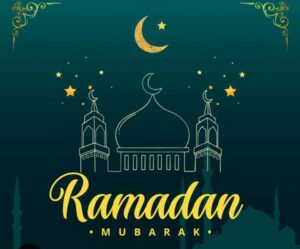

By Bello Shehu Tamaje.

Credit: Canva.
Ramadan is one of the most spiritual months in Islam. It is a period when Muslims are expected to abstain from eating, drinking, and other forms of carnal desires with their spouses during the day for an entire month.
It is a special occasion for spiritual cleansing and devotion to Allah, our Creator. Ramadan provides an opportunity for repentance, self-reflection, and drawing closer to Almighty God. It is also a path to eternal salvation, as fasting is an act of worship dedicated to Allah, who rewards those who observe it according to the teachings of Prophet Muhammad (SAW).
Fasting, therefore, is an integral part of the Islamic faith. Its essence is for all Muslims to experience hunger, cultivate perseverance, and ultimately earn Allah’s mercy and blessings. This period serves as a reminder to both the rich and the poor that all are equal before the Almighty.
Fasting instills the virtues of moderation, patience, and piety. Due to its immense rewards and benefits, Muslims are encouraged to share, show love, and extend compassion to the less privileged and vulnerable members of society.
The level of care and generosity during this period is expected to increase significantly, ensuring that no one lacks the means to observe the fast comfortably.
In Nigeria, the way Muslim faithful observe this religious ritual highlights its importance in their spiritual well-being. On this premise, individuals and organizations make concerted efforts to leverage the occasion by being charitable and benevolent, helping others have a rewarding and blessed Ramadan.
Islam enjoins Muslims to assist the needy by providing food and other essentials, fostering a peaceful society where poverty is alleviated.
During the month of Ramadan, communities organize food distribution programs, ensuring that people have access to the necessities required to observe the fast. In Northern Nigeria, where the majority of the population is Muslim, various state governments implement feeding programs to support the fasting population.
States that engage in these programs allocate significant resources to establish feeding centers stocked with food, fruits, drinks, and water. These centers become gathering points at dusk, where people come together to break their fast and prepare for the next day.
The primary beneficiaries of these programs are the less privileged, orphans, and travelers who cannot reach their homes in time for iftar. Over the years, these initiatives have served as a lifeline for those who struggle to afford daily meals, offering both sustenance and a sense of communal solidarity.
While these programs have generally been successful, they have evolved over time to become more efficient.
In Sokoto State, for instance, the feeding program was recently restructured to maximize its impact and efficiency—a significant improvement from its previous operations. The revamped system received increased funding and additional feeding centers, enabling more people to benefit.
Last year, in its first fully restructured phase, the Sokoto State Government allocated approximately ₦6.7 billion to enhance the program and improve its reach. This funding covered both state and local government centers, which were previously neglected under the old system before Governor Ahmad Aliyu assumed office.
Preparations for the 2025 Ramadan feeding program are now in advanced stages, with the governor pledging to expand the initiative and inject more resources to ensure an even better experience than the previous year.
This move fulfills his pledge to improve the quality of life for the poor and create an enabling atmosphere for their spiritual growth, as encapsulated in his nine-point agenda.
As more people are set to benefit from this expanded program, Islamic scholars and clerics have urged wealthy and well-meaning individuals to complement the government’s efforts by establishing their own feeding centers. Given the current harsh economic situation in the country, such contributions would provide much-needed relief to the less fortunate.
The appeal from clerics is a call for individuals to seize the opportunity of Ramadan to earn Allah’s favor and blessings. Islam promises immense rewards to those who support fasting Muslims.
Islam teaches its followers to be their brother’s keeper and to show love and kindness to their neighbors. The benefits of Ramadan are both spiritual and material, making it an opportune time for increased devotion and acts of charity. By extending a helping hand, individuals can strengthen their relationship with their Creator and secure eternal salvation.

